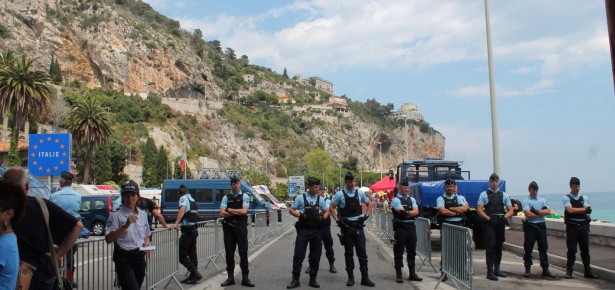
This summer, France’s border police have deployed en masse on the French-Italian border. The heightened policing operations aim to prevent the record numbers of migrants who have arrived in Italy over the past six months from crossing a border that – according to the Schengen Agreement signed by both France and Italy – should not hinder the free transit of individuals within Europe. Yet the ideal of “borderless Europe” bears little resemblance to the situation on the ground in the Italian town of Ventimiglia.
As efforts on the part of the European Commission to broker a coordinated policy response have stalled, migrant rights advocates in France have turned to the courts.
When it comes to issues of migration policy, legal guarantees are seldom absolute
Appealing to law is not itself news; judicial engagement has been an institutionalized feature of immigration policy dynamics in France since the mid-1970s. It was at this time that French immigrant defenders began to routinely challenge restrictionist administrative policies before France’s highest administrative jurisdiction, the Conseil d’Etat.
As a second-generation American with family ties to France’s former colonial territories in the Arab world (not coincidentally, the single largest source of this summer’s record numbers of migrants to Europe), I wanted to know what the French legal system could do for minority groups facing discrimination and exclusion? Having studied the U.S. experience of seeking change in the courts, I wondered how legal activism might operate differently in a country such as France, where an elite administrative jurisdiction substitutes for an inaccessible constitutional court.
Liberal law has a powerful association with justice, and for this reason it is tempting to assume that judicial review can serve as a trump card against oppressive actions of the state.
However, particularly when it comes to issues of migration policy, legal guarantees are seldom absolute. Judges may assert their authority to adjudicate questions of migration policy, and may even overturn some regulations, while nevertheless allowing administrators the leeway to maintain the bulk of border control agenda intact.
Last month, French legal activist groups petitioned the Conseil d’Etat to order a halt to police operations at the French-Italian border. Their complaint argued that French border police had targeted migrants by appearance, had systematically failed to follow administrative procedures protecting asylum seekers, and had violated the Schengen Agreement’s guarantee of free circulation.
The Conseil d’Etat’s handling of the case illustrates the limited capacity of legal rules and remedies to compel change in immigration control policies. The court agreed that failures on the part of the border police to follow asylum procedures would be grounds for action, but it insisted that individual claims to this effect would need to be pursued in lower courts. As for any alleged violation of the Schengen Agreement, the Conseil d’Etat chose to treat the police activity as a permissible temporary measure, “not equivalent to the implementation of a permanent and systematic control at the French-Italian border.”
This does not mean that migrant advocates should view legal activism as a waste of time. In France, persistent high-profile litigation has offered a platform for shaping public debate and has raised the profile of groups associated with it. These radiating effects are rarely immediately visible but should not be dismissed.
Over the past ten years, as I made regular research visits to France, I observed a striking expansion of intra-European civil society collaborations on behalf of vulnerable migrants. French migrant advocates and their Italian counterparts are increasingly coming together and developing a coordinated strategy at the national and regional level. In this context of creative cross-border collaboration, legal frames and narratives offer an important symbolic device for rehumanizing the vulnerable migrants trapped at the margins of “borderless Europe.”
The accompanying photo of police barricades on the French side of the border at Ventimiglia is courtesy of GISTI. It was submitted as documentation accompanying their complaint to the Conseil d’Etat.
Latest Comments
Have your say!